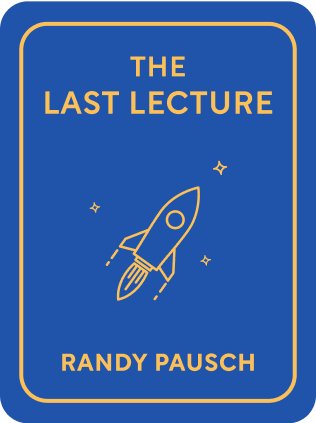

This article is an excerpt from the Shortform book guide to "The Last Lecture" by Randy Pausch. Shortform has the world's best summaries and analyses of books you should be reading.
Like this article? Sign up for a free trial here .
How can practicing Randy Pausch’s wise words to live by improve your life? What is Pausch’s advice for living?
Before he passed away, Pausche shared his 18 wise words to live by in his Last Lecture. If you do your best to follow Pausch’s advice, then you can live your life like the fun-loving Tigger rather than the gloomy Eeyore.
Keep reading for Pausch’s wise words to live by from The Last Lecture.
Advice for Living
Pausch believed everyone has a choice in life to be like one of two Winnie-the-Pooh characters: you can be like fun-loving, exuberant Tigger or like gloomy Eeyore.
Throughout his life, Pausch was a Tigger, looking for the fun in everything. Even having cancer didn’t turn him into an Eeyore—he made a point of having fun each day he had left. For instance, for his last Halloween, he and his family dressed like the Disney superheroes, the Incredibles. He posted a photo on his website, with a caption noting that chemotherapy hadn’t affected his superpowers, which was a reference to the costume’s exaggerated muscles.
He took a scuba-diving trip with three old friends (all Tiggers), and despite an awareness that it was their last time together, they focused on the moment, joking and making fun of each other. The others poked fun at Pausch for the “St. Randy of Pittsburgh” reputation he had acquired after giving his Last Lecture.
Pausch vowed to hold onto his Tigger persona to the end, saying there wasn’t any “upside” to being a sad Eeyore. He shared his advice for living in his Last Lecture, hoping to inspire others to be a Tigger as well.
Wise Words to Live By
Here’s more of Pausch’s wise words to live by, based on how he tried to live his life.
Dream big: The first of Pausch’s wise words to live by is to dream big. When men walked on the moon in 1969, Pausch was at summer camp and missed seeing the historic landing of the lunar module on television. He was disappointed to have missed it, but thrilled that his father had taken a photo for him from the family’s television set at home. For Pausch, the photo was a message that anything is possible and an inspiration to dream big.
Be earnest: Being earnest is more important than being hip. Being hip means focusing on short-term gratification, while being earnest is about working to accomplish something that lasts. An Eagle Scout is an example of earnestness paying off. It takes perseverance to achieve the rank, and the values it reflects stick with you and impress others well into adulthood.
Don’t resist mom: Don’t bother resisting your mom—she’ll win every time. For instance, no matter how often Pausch asked his mother to stop calling him “Randolph,” it did no good. Finally, he gave up debating with her and decided to appreciate her more instead.
Don’t complain: Complaining doesn’t advance your goals or make you happier. When you run into challenges, work harder rather than complaining. Jackie Robinson, the first African-American to play Major League baseball, knew he had to work harder than white players and, despite harassment from fans, that’s what he did.
Learn to work together: The ability to work effectively with others is essential in the workplace and in family life. Here are Pausch’s tips for his students: Properly introduce yourself, have a comfortable meeting spot, allow everyone to speak (don’t interrupt or finish others’ sentences), don’t be egotistical about claiming credit, praise each other, and ask questions rather than making assertions.
See the best in everyone: Almost everyone has a good side. When you feel frustrated with someone, it may mean you haven’t given them enough time to show you their good side. Be patient.
Pay attention to actions, not words: A female colleague told Pausch that in relationships with men, she’d learned to pay attention to what they did rather than to what they said—which is good advice for most interactions.
Don’t shun cliches: Cliches are valuable because they say something useful in a memorable way. Many younger people don’t know the older cliches, so don’t be afraid to quote them. Some of Pausch’s favorites were:
- Dance with the one who brung you.
- Luck is what happens when preparation meets opportunity.
- Whether you think you can or can’t, you’re right.
- Other than that, Mrs. Lincoln, how was the play? (focus on the important things).
Take the risk: When you’ve failed, you’ve learned something about how to succeed in the future. In fact, failing is such an integral part of success that Pausch liked to give an award for the most spectacular failure to student teams who took big creative risks and failed. He dubbed it the “First Penguin Award”—the name comes from the way one penguin in a flock always jumps into the water ahead of the others, taking the biggest risk of being eaten by predators.
Show gratitude: When people give you their time and attention, write them a thank-you note. You’ll stand out because thank-you notes are rare, which may benefit you in the future. But more importantly, showing gratitude is a sign of character. If you can’t adequately pay someone back for a kindness, pay it forward. Pausch made a point of showing gratitude in both large and small ways. For instance, he sent cookies to colleagues who reviewed journal articles for him. Also, after receiving tenure, Pausch thanked his research team for their contribution to his success by taking them on a week-long trip to Disney World.
Work hard: Although people often want to avoid work, there’s no benefit to taking a shortcut. The more you work, the more you learn about your subject or pursuit and the bigger the eventual reward. Work is like interest on your savings—it compounds. When Paush received tenure earlier than is typical, colleagues wanted to know how he’d done it. In reply, he invited them to call him at 10 p.m. at his office on any Friday night—in other words, he worked hard for it.
Be prepared: Planning goes a long way. Think about everything that can go wrong—especially the worst-case scenario—and have a contingency plan. Then you can be an optimist and not worry about potential problems because you’ve prepared for them. For instance, Pausch cited a classmate who had brought along an extra light bulb for a presentation using a projector. Sure enough, the projector’s light went out, but because the student was prepared, he was able to quickly replace it and carry on, rather than cutting the presentation short.
Apologize sincerely: Another one of Pausch’s wise words to live by is to apologize sincerely. A half-hearted apology is worse than none at all. A sincere apology consists of these steps: 1) state what you did wrong, 2) express remorse for hurting someone, and 3) ask how you can make amends. This was Pausch’s advice to his students when friction developed during team projects—for instance, when some students didn’t pull their weight. Sincere apologies smoothed things out and allowed the teams to complete their work successfully.
Be truthful: People often lie to avoid expending effort and they usually think they got away with it. But most often, they didn’t. The people you lie to always remember it and tell others. To quote a cliche, you’re only as good as your word.
Stay in touch with your childhood dreams: Carry a Crayon with you, and take it out when you need inspiration—the smell and feel will remind you of your childhood dreams and the thrill and potential of unbounded creativity.
Don’t look down on menial work: Don’t look down on menial work or on starting at the bottom. If you don’t take menial work seriously and do it well, why should anyone trust you to do more? Pausch learned that lesson as a boy while working with day laborers to hoe strawberries. Several coworkers were teachers, making extra money while school was out, and Pausch commented to his father that the work was beneath them. His father shot back that he’d rather his son be the best ditch digger he could be than a self-important elitist.
Serve the common good: Like it or not, you’re part of a community—in exchange for the benefits of being in a group, you have a responsibility to give back. If you don’t contribute, you’re selfish and undermining the benefits you enjoy. An example of not giving back is supporting the constitutional right to a jury trial, but trying to get out of performing jury duty.
Be both optimistic and realistic: The last of Pausch’s wise words to live by is to be optimistic yet realistic. Well-meaning friends sometimes tell cancer patients to be optimistic or their treatments will fail. As a result, when they have setbacks or bad days, patients feel guilty for not being positive enough. However, optimism must be coupled with realism. Pausch believed he could be realistic about his condition, but also be optimistic that he could do things to improve how he felt and continue to find joy in daily life.

———End of Preview———
Like what you just read? Read the rest of the world's best book summary and analysis of Randy Pausch's "The Last Lecture" at Shortform .
Here's what you'll find in our full The Last Lecture summary :
- What Randy Pausch's philosophy of life was
- How a professor with only months to live recounted his life's experiences and lessons
- How a computer science professor ended up on a secret project with Disney






